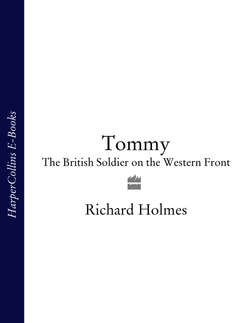Читать книгу Tommy: The British Soldier on the Western Front - Richard Holmes - Страница 8
ОглавлениеPROLOGUE: TOMMY ATKINS
In 1815 a War Office publication showing how the Soldier’s Pocket Book should be filled out gave as its example one Private Thomas Atkins, No. 6 Troop, 6th Dragoons. Atkins became a sergeant in the 1837 version, and was now able to sign his name rather than merely make his mark.
By the 1880s the expression ‘Tommy Atkins’ was in wide use to describe the prototypical British soldier, and Kipling’s poem Tommy summed up the nation’s ambivalence about her defenders.
… Then it’s Tommy this, an’ Tommy that an’ ‘Tommy, ’ows’s your soul?’ But it’s ‘Thin red line of ’eroes’ when the drums begin to roll …
… For it’s Tommy this an’ Tommy that, an’ ‘Chuck him out, the brute!’ But it’s ‘Saviour of ’is country’ When the guns begin to shoot; An’ it’s Tommy this, an’ Tommy that, an’ anything you please; An’ Tommy ain’t a bloomin’ fool – you bet that Tommy sees!
During the First World War the nickname was widespread, with derivatives like Tommy cooker, for a small trench stove, talking ‘Tommy’, to describe other rank repartee, or even ‘Tommyness’, to define certain attitudes and behaviour. When British and German soldiers yelled greetings or insults across No Man’s Land it was always ‘Fritz’ and ‘Tommy’.
A corporal writing in 1914 caught the man in all his lights and shades: ‘Sometimes Tommy is not a pleasant fellow, and I hated him that afternoon. One dead German had his pockets full of chocolate. They scrambled over him, pulling him about, until it was all divided.’ An engineer officer saw a large Frenchwoman fall into a canal, to be tugged to the bank by ‘two tommies’ who, in their eagerness to help, pulled her dress up over her head, demonstrating that knickers were not then universal in rural France. The expression was, of course, prohibited. A divisional commanders’ conference in October 1915 affirmed that: ‘The use of the word “Tommy” to be absolutely barred. The term is never permitted in a good regiment.’
The order had as much effect as so many others, and the nickname persisted, sometimes as Tommy, sometimes as Atkins, and once, memorably, as ‘Mr Atkins, gentleman’, used by an officer who saw soldiers helping refugees with gentleness and generosity. Nicknames are not always popular with their recipients, and such was the case with Tommy. Many soldiers felt patronised by it, and its English implication grated on Scots, Irishmen and Welshmen. But Sergeant Charles Arnold, himself a quintessential Tommy, declared that:
Tommy Atkins – full private – is, when all is said and done, the one who won the war. He won it by sheer dogged pluck … When is something going to be done for the man who isn’t a general or a guardsman or an Anzac, nor even a London Scot but just a clodhopper from Suffolk, or Devon, or Durham – the man who obeyed orders and stuck it out? Of this man little was heard, possibly because he had a habit of going into places a thousand strong and coming out a remnant of a hundred and fifty or so. Dead men tell no tales of their own glory.
